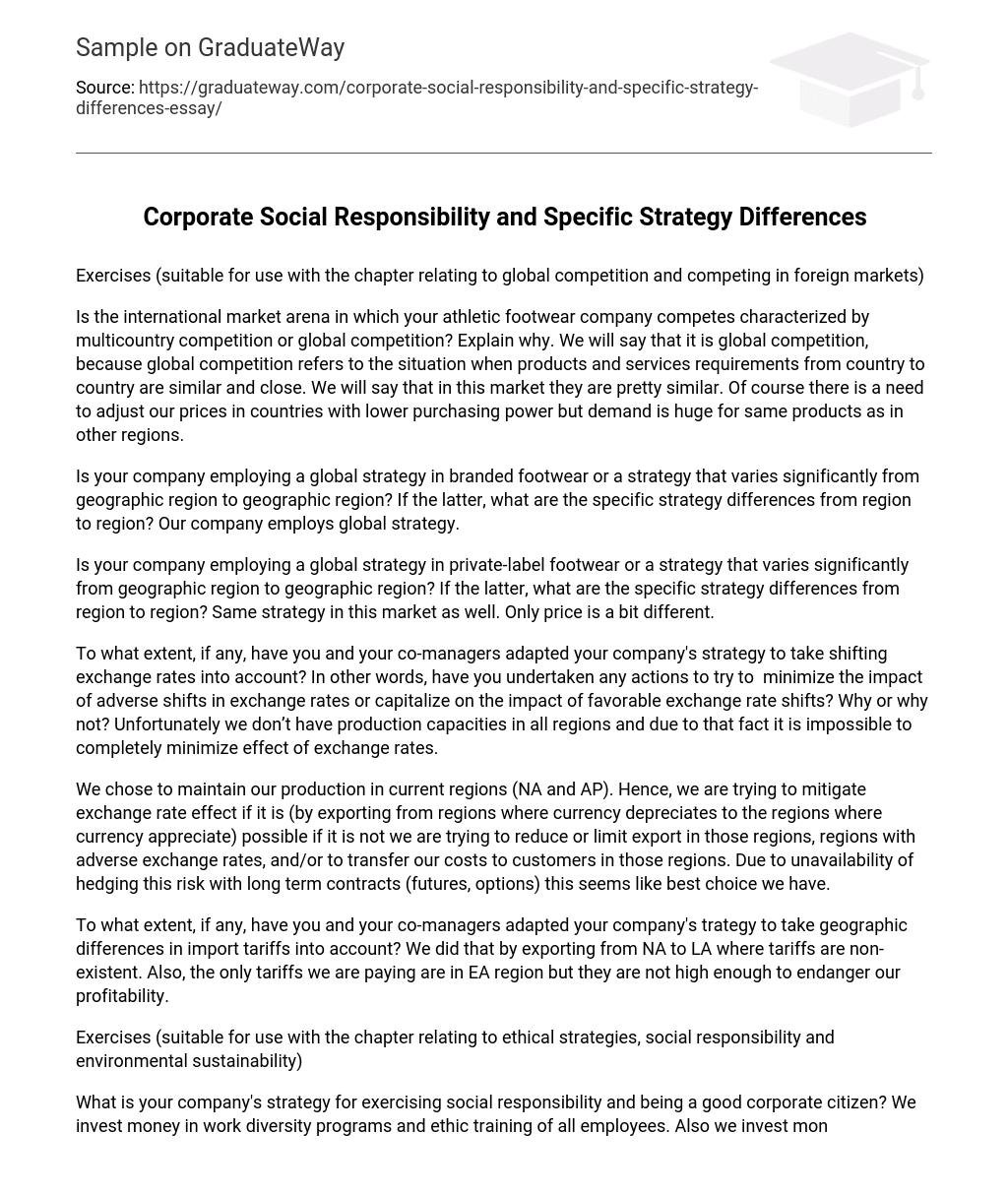Exercises (suitable for use with the chapter relating to global competition and competing in foreign markets)
Is the international market arena in which your athletic footwear company competes characterized by multicountry competition or global competition? Explain why. We will say that it is global competition, because global competition refers to the situation when products and services requirements from country to country are similar and close. We will say that in this market they are pretty similar. Of course there is a need to adjust our prices in countries with lower purchasing power but demand is huge for same products as in other regions.
Is your company employing a global strategy in branded footwear or a strategy that varies significantly from geographic region to geographic region? If the latter, what are the specific strategy differences from region to region? Our company employs global strategy.
Is your company employing a global strategy in private-label footwear or a strategy that varies significantly from geographic region to geographic region? If the latter, what are the specific strategy differences from region to region? Same strategy in this market as well. Only price is a bit different.
To what extent, if any, have you and your co-managers adapted your company’s strategy to take shifting exchange rates into account? In other words, have you undertaken any actions to try to minimize the impact of adverse shifts in exchange rates or capitalize on the impact of favorable exchange rate shifts? Why or why not? Unfortunately we don’t have production capacities in all regions and due to that fact it is impossible to completely minimize effect of exchange rates.
We chose to maintain our production in current regions (NA and AP). Hence, we are trying to mitigate exchange rate effect if it is (by exporting from regions where currency depreciates to the regions where currency appreciate) possible if it is not we are trying to reduce or limit export in those regions, regions with adverse exchange rates, and/or to transfer our costs to customers in those regions. Due to unavailability of hedging this risk with long term contracts (futures, options) this seems like best choice we have.
To what extent, if any, have you and your co-managers adapted your company’s trategy to take geographic differences in import tariffs into account? We did that by exporting from NA to LA where tariffs are non-existent. Also, the only tariffs we are paying are in EA region but they are not high enough to endanger our profitability.
Exercises (suitable for use with the chapter relating to ethical strategies, social responsibility and environmental sustainability)
What is your company’s strategy for exercising social responsibility and being a good corporate citizen? We invest money in work diversity programs and ethic training of all employees. Also we invest money in energy efficiency initiatives.
Would your company pursue a corporate social responsibility strategy if there was no payoff in the form of a higher image rating? Why or why not? Probably not because it doesn’t have any impact on the game and the goal of the game is to have high profits. Hence, if our goal is to win this game that would be useless spending of money.
Should shareholders be pleased with your company’s social responsibility strategy and the amount of resources you are devoting to this effort?
Is there anything that your company is doing that could be considered as “shady” by your competitors? There is nothing that our competitors could consider “shady” in our company operations. However, they will give better answer on this question.
Is there anything that any of your competitors are doing that you consider as “shady” or “unethical? There is nothing we consider “shady” in operations of our competitors.
Is it “unethical” or at least socially irresponsible for a company to avoid conducting its business in a manner in an environmentally sustainable manner? Why or why not? It is “unethical” and irresponsible because we should think about future generations. Business should involve examining business processes and practices in terms of people, planet and profit, and seeking out ways to create a positive impact in each of these areas. For example, implementing environmentally ustainable practices and green supply chain management has the potential to eliminate waste and generate cost savings, leading to a stronger bottom line.
Is it “unethical” or at least socially irresponsible for a company to make no charitable contributions whatsoever? Support your answer? It could be perceived as unethical. However in essence of business is making profit not making charitable contributions. Also, a lot of companies which gives charitable contributions do that because of some latent or manifest benefit they could have.





